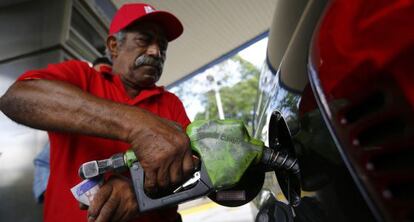Venezuela buys US crude for first time
The country, home to one of the world’s biggest reserves, has purchased 550,000 barrels

Venezuela, one of the biggest oil-producing nations in the world with nearly 300 billion barrels of proven reserves, has begun importing crude oil to help its staggering economy.
State-owned Petróleos de Venezuela (Pdsva) last month purchased 550,000 barrels of West Texas Intermediate (WTI) – one of the benchmark crudes on the global market – through its Citgo Petroleum affiliate in the United States.
The deal was made with the goal of using it to dilute Venezuela heavy crude on the Caribbean island of Curaçao, where Pdvsa operates a refinery, Reuters reported.
Venezuelan crude fetches less on the global petroleum markets because it is very heavy and takes additional refining before it can be sold for consumer use.
The deal was made with the goal of using it to dilute Venezuela heavy crude in Curaçao
This is the first time in the 100-year history of Venezuela’s active petroleum industry that the country has been forced to import crude from abroad.
In 2014, the impact of erratic business practices and lack of investment pushed Pdvsa to embark on new strategies, including opening offices in Algeria, Nigeria and Angola.
At the same time, Venezuela also began purchasing gasoline and other fuel products from the United States to meet domestic demand.
It was not until last December that the US government lifted a 40-year ban to allow the export of crude from the United States to other countries.
A surge in US production over the past decade, driven in part by shale drilling in Texas and North Dakota, led to oil industry and policy makers to push for the lifting of the ban, which was set in place by President Gerald Ford during the energy crisis in the mid-1970s.
For more than a decade, the Caracas government – under the late Hugo Chávez and now headed by his handpicked predecessor Nicolás Maduro – has accused Washington of orchestrating conspiracies to overthrow the Bolivian revolutionary socialist movement implanted by Chávez.
Caracas blames the Obama administration for manipulating the global energy markets in a concealed effort to ruin the economies of Venezuela and its allies, such as Russia, which also relies heavily on oil sales.
The Obama administration lifted a 40-year ban last month to allow the export of crude from the US to other countries
The Venezuelan government does not issue official production figures, but analysts believe that the country produces 2.7 million barrels of oil a day – a much lower figure than the five million Chávez predicted his country would be producing by this date.
The majority of Venezuela’s production consists of medium and heavy crude.
The Orinoco Petroleum Belt, located in the southeast of the country, contains one of the biggest proven oil reserves in the world. For many years, transnational companies have been interested in investing in drilling operations; some have already begun joint operations with Pdvsa at a number of wells.
But the crudes coming from these reserves are heavy and extra-heavy, which make them more costly to refine and resell on the world market.
Production costs for Venezuelan heavy crude is about $18 a barrel, but Pdvsa also markets diluted blends, which can be sold at around $15 a barrel, Reuters reported.
While President Maduro has blamed his country’s economic woes on plummeting world oil prices – claiming that Venezuela has lost 80% of its revenue – the nation’s oil production has been steadily dropping in recent years.
At the same time, an estimated 600,000 barrels a day are destined for the Chinese market to help pay off loans the Beijing government granted to Venezuela’s allies under special terms.
English version by Martin Delfín.
Tu suscripción se está usando en otro dispositivo
¿Quieres añadir otro usuario a tu suscripción?
Si continúas leyendo en este dispositivo, no se podrá leer en el otro.
FlechaTu suscripción se está usando en otro dispositivo y solo puedes acceder a EL PAÍS desde un dispositivo a la vez.
Si quieres compartir tu cuenta, cambia tu suscripción a la modalidad Premium, así podrás añadir otro usuario. Cada uno accederá con su propia cuenta de email, lo que os permitirá personalizar vuestra experiencia en EL PAÍS.
¿Tienes una suscripción de empresa? Accede aquí para contratar más cuentas.
En el caso de no saber quién está usando tu cuenta, te recomendamos cambiar tu contraseña aquí.
Si decides continuar compartiendo tu cuenta, este mensaje se mostrará en tu dispositivo y en el de la otra persona que está usando tu cuenta de forma indefinida, afectando a tu experiencia de lectura. Puedes consultar aquí los términos y condiciones de la suscripción digital.








































